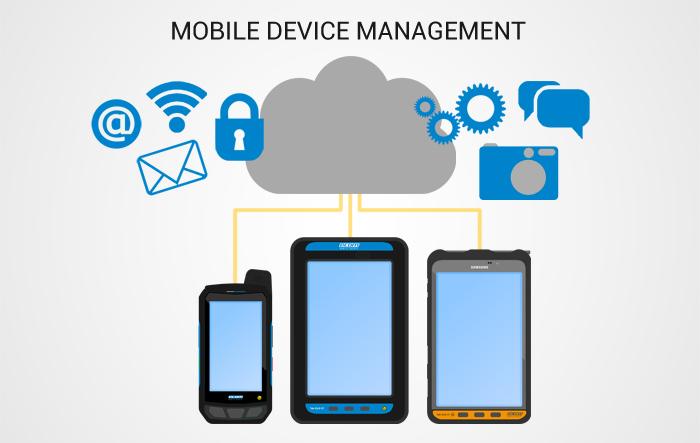Enhancing Security and Efficiency with Mobile Device Management (MDM)

In today's fast-paced digital world, mobile devices have become an integral part of both personal and professional life. Businesses increasingly rely on smartphones, tablets, and laptops to streamline operations, improve communication, and enhance productivity. However, with the rise in the use of mobile technology comes the critical need to manage and secure these devices efficiently. Mobile Device Management (MDM) has emerged as a vital solution that allows organizations to control, monitor, and secure mobile devices within their network. By leveraging MDM solutions, companies can ensure data protection, compliance, and seamless device management across various platforms.
Mobile Device Management is a technology solution that provides centralized control over mobile endpoints such as smartphones, tablets, and laptops. The primary purpose of MDM is to enhance security while allowing employees the flexibility to use their own or company-provided mobile devices for work purposes. MDM software typically enables IT administrators to configure device settings, enforce security policies, monitor device usage, and remotely manage or wipe devices if they are lost or stolen. As organizations increasingly adopt bring-your-own-device (BYOD) policies, MDM plays a crucial role in safeguarding sensitive company data across diverse and distributed devices.
The key features of a robust MDM solution include device enrollment, policy enforcement, application management, remote wipe capabilities, and real-time monitoring. Device enrollment is the first step in incorporating a mobile device into an organization's network, allowing administrators to gain visibility and control over it. Through policy enforcement, companies can set up rules regarding password strength, encryption, access permissions, and app installation. Application management ensures that only approved and secure apps are installed, reducing the risk of malware or data leaks. In case a device is compromised or lost, remote wipe functions allow IT teams to delete all sensitive information to prevent unauthorized access. Real-time monitoring offers insights into device performance and compliance status, enabling quick responses to potential threats.
One of the most significant advantages of MDM is enhanced security. As cyber threats become more sophisticated, protecting corporate data on mobile devices is essential. MDM helps enforce encryption, VPN usage, and multi-factor authentication, ensuring that sensitive information remains secure. It also prevents data breaches by enabling remote lock and wipe capabilities. For businesses in highly regulated industries like finance and healthcare, MDM supports compliance with regulations such as GDPR, HIPAA, and PCI DSS by providing detailed audit trails and reporting functions.
Another benefit of MDM is improved operational efficiency. IT departments can manage hundreds or thousands of devices remotely, reducing the time and effort needed for manual configuration and troubleshooting. Automated updates, software installations, and policy enforcement allow businesses to maintain a consistent and secure device environment. Additionally, MDM platforms offer analytics and reporting tools that help administrators identify underutilized resources, track employee productivity, and optimize IT assets. By centralizing device management, organizations can reduce downtime, increase productivity, and lower operational costs.
The implementation of BYOD policies in many workplaces has increased the relevance of MDM. While BYOD offers flexibility and cost savings, it also presents unique security challenges. Employees may use unsecured networks, download risky apps, or lose devices that contain sensitive company data. MDM solutions address these issues by creating a secure container on personal devices that separates corporate data from personal information. This dual approach protects company assets without infringing on employees’ privacy, ensuring a balanced and secure mobile work environment.
Cloud-based MDM solutions have gained popularity due to their scalability, ease of deployment, and lower upfront costs. With cloud MDM, organizations can manage devices across different locations without the need for extensive on-premises infrastructure. This is especially beneficial for small and medium-sized enterprises (SMEs) looking to implement cost-effective and efficient device management solutions. Cloud-based platforms also offer seamless integration with other IT systems such as identity management and endpoint security, creating a comprehensive and unified IT ecosystem.
However, implementing an MDM solution is not without challenges. Organizations must carefully select an MDM platform that aligns with their business needs, device types, and security requirements. Proper planning, stakeholder involvement, and employee training are essential for a successful MDM rollout. Companies must also ensure that their MDM policies are transparent and communicated clearly to avoid resistance or misunderstandings among employees. Regular audits and updates are necessary to keep up with evolving security threats and technology changes.
The future of Mobile Device Management is likely to be shaped by emerging technologies such as artificial intelligence (AI), machine learning, and 5G connectivity. AI-powered MDM solutions can proactively detect anomalies, automate threat responses, and optimize device performance. With 5G enabling faster data speeds and more connected devices, MDM will need to adapt to manage a broader array of endpoints, including IoT devices and wearables. Additionally, the integration of MDM with Unified Endpoint Management (UEM) systems will provide holistic control over all endpoints—mobile and beyond—creating a seamless and secure digital workplace.
Source - https://www.marketresearchfuture.com/reports/mobile-device-management-market-1247
Mobile Device Management has become a cornerstone of modern enterprise IT strategy. As mobile devices continue to proliferate in the workplace, MDM offers the tools and capabilities needed to secure, manage, and optimize their use. By investing in a comprehensive MDM solution, organizations can not only safeguard sensitive data but also enhance operational efficiency and support a flexible, mobile-first workforce. In a world where digital transformation is the norm, MDM is essential for staying secure, compliant, and competitive.
- Art
- Causes
- Crafts
- Dance
- Drinks
- Film
- Fitness
- Food
- الألعاب
- Gardening
- Health
- الرئيسية
- Literature
- Music
- Networking
- أخرى
- Party
- Religion
- Shopping
- Sports
- Theater
- Wellness
